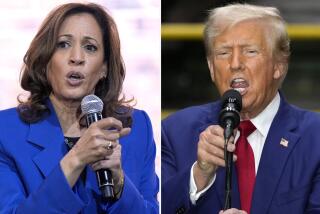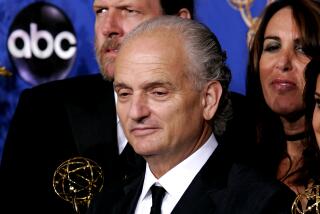A bare- knuckle Emmy battle
- Share via
In unscripted television shows, characters settle their differences in plain view, and the results, while often interesting to watch, are seldom flattering to anyone involved.
The same could easily be said of this week’s drama surrounding rights to televise the Emmy Awards, which followed a messy, fractious path to what most would agree was a fairly equitable and logical conclusion.
The Academy of Television Arts & Sciences possessed scant leverage in dealing with the major networks, which, in an uncertain economy, were reluctant to pony up a major raise over the $3-million annual fee they had been paying to share the awards on a rotating basis.
Enter Home Box Office, the pay cable service. Once the academy was free to entertain outside offers, HBO agreed to its $10 million-a-year asking price, setting off a flurry of negotiations that concluded Wednesday night at the nonprofit group’s monthly board meeting.
Ultimately, the networks committed to a substantial raise -- more than doubling the current fee, to an average $6.5 million over the next eight years -- that still fell well short of HBO’s bid.
How they got there, however, underscores just how much clout the industry’s major players wield and provided a stark display of the hardball manner in which they can exercise it.
Stunned by the prospect of losing the Emmys to HBO, the major networks stated that they would withdraw support from the ceremony should the academy strike an exclusive deal, in the process crippling not only the awards but the organization itself.
The networks stressed that these weren’t idle threats. In presenting the network proposal on behalf of ABC, CBS, NBC and Fox on Wednesday, sources say CBS Television President Leslie Moonves delineated all sorts of punitive actions the networks could take if the academy went with HBO, from discouraging employees from joining the group to scheduling a big-budget special the night of the Emmys to siphon away potential viewers.
“They said that this will destroy the academy,” said one industry source with knowledge of the situation.
Such rhetoric couldn’t be lost on the academy’s elected officers or governors, who are volunteers who work in the TV industry. The academy is structured to represent the entire industry, from craftspeople such as hairstylists and sound technicians to actors, writers and executives.For academy representatives, alienating high-powered network executives was hardly an enticing option. To cite one example, the academy’s chairman, Bryce Zabel, is a writer-producer with a series prototype in development at CBS.
Academy officials were said to be taken aback by the vehemence of the networks’ response, even though there is precedent for it. When Fox and ABC gained exclusive rights to the awards, competing networks threatened to boycott the ceremony and opted not to buy tickets to the event.
Perhaps most seriously, the networks raised the possibility of establishing a rival awards program, though recent events -- including awards presented by TV Guide and the American Film Institute -- have drawn lackluster ratings.
Through these warnings, network officials delivered a clear message to both the academy and HBO -- namely, if the rival bid proved successful, the pay channel would be acquiring a damaged franchise.
In addition, even if HBO had been simply acting as a stalking horse for the academy, the channel appeared to have miscalculated how the channel’s offer would be perceived in light of its success winning awards, which has already irked competitors. In fact, industry sources have suggested that the Emmys are worth far more to HBO airing on the major networks, providing wider exposure for nominated programs such as “The Sopranos,” “Sex and the City” and “Six Feet Under.”
With this week’s game of “TV Smackdown!” behind it, the academy can now focus on what to do with its new revenue. Known best for presenting the Emmys, the organization faces pressure to expand a profile characterized in recent years by internal bickering that has turned off some members.
Many point to the Superhighway Summit, which assembled industry heavyweights to examine the future of telecommunications, as an example of the leadership role the academy can play, but that took place in 1994, and few initiatives since have approached that level of ambition.
Having long complained about the networks’ paltry license fee compared to the Grammys or Oscars, the group must solidify its status as an industry forum and more fully develop its outreach activities, which include college scholarships, internships and a videotape archive chronicling the memories of industry veterans. If not, the networks might well ask what their millions are buying.
As for the average viewer and the industry’s rank and file, nothing much has changed.
The Emmys will still be seen on a major network. Millions will watch elegantly attired stars, writers and directors parading to the podium to accept awards from their peers ... and, as often as not, thanking HBO.
More to Read
The complete guide to home viewing
Get Screen Gab for everything about the TV shows and streaming movies everyone’s talking about.
You may occasionally receive promotional content from the Los Angeles Times.






